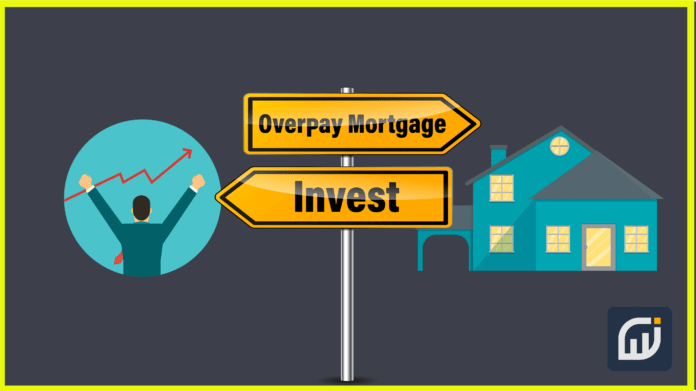A mortgage is typically the most significant debt of any household. Indeed, the average mortgage debt in the UK last year was about £138,000. The average mortgage debt is even higher for those in major metro areas like London. Due to the size of the debt, many people wonder if it makes sense to overpay their mortgage. After all, any little bit that goes towards reducing the balance feels good and puts homeowners that much closer to removing the single most significant debt on their shoulders.
The answer is often that it doesn’t make sense to overpay as there are typically better uses for your money (more on this later). However, there are five specific cases when it does make perfect sense to overpay your mortgage and reduce the amount you owe on your home.
Overpay Your Mortgage: Most Often, It Doesn’t Make Sense
Interest rates on mortgages have been historically low. Indeed, the typical SVR that mortgagees are paying is at its highest level in 13 years, and even then, that amount is only 4.91%.
By contrast, the FTSE 100 has had annualised total returns of 7.75% since 1984.
Even with the most recent rate increases, you would be better off taking any money you had to overpay your mortgage and putting it into an index fund that tracks the FTSE. Of course, past performance is no guarantee of future returns, but assuming UK companies continue to do well, there’s a good chance the returns you will see on shares will at least equal what you would save on your mortgage.
Plus, you can invest in stocks and shares with ISAs and have your gains be free from UK tax (you can put up to £20,000 in these accounts annually).
And, for those who carry credit card, car, or other unsecured debts, the vast majority of the time, the interest rate will be higher on this debt than the mortgage. Indeed, the average credit card rate was 21.49% at the end of 2021, which is over 4x higher than the interest rate on a mortgage.
Therefore, for most people, investing or paying down other debt is the better option with excess cash.
As with anything financial, though, there are exceptions. In particular, there are five reasons you would want to overpay your mortgage.
You’re Approaching Retirement

Suppose you are approaching retirement and have no credit card or car loan debt, so paying those higher balances isn’t an option. As you get closer to retirement, you want to expose yourself less to the market’s whims and opt for more stable investments. While it is true that the FTSE 100 has averaged over 7% since 1989, there’s no guarantee that the FTSE won’t drop 30% tomorrow. That’s why people move their money out of equities as they get older and more into cash, bonds, and other stable investments.
If you are approaching retirement and still have a mortgage, overpaying it makes complete sense for two reasons.
First, when you overpay your mortgage, you reduce the time it takes to pay it off. If you have a mortgage that will mature in your retirement years, overpaying your mortgage enough could potentially mean you’d retire free of all debts and not as a homeowner still bound by significant monthly payments. You’ll have a higher quality of life if you can do that!
Second, overpaying your mortgage is a guaranteed return on your money and probably much higher than what you can get in a bank account. Overpaying your mortgage means you’ll save quite a lot of interest over the life of your loan, and those savings can, again, give you a better quality of life in your golden years!
You Don’t Like to Take Risks
This point is a corollary to the first point but worth mentioning on its own. You don’t need to be approaching retirement not to want to take risks. Some people don’t like investing in equities and would rather keep their cash in a savings account.
Assuming you have at least six months’ worth of expenses saved, adding more cash to your bank account quickly becomes of decreasing value. Quite simply, the interest you earn is not as good as the interest you can save by overpaying your mortgage. Indeed, the interest you earn in your bank account often won’t be enough to cover inflation.
Instead, channelling your excess funds towards your mortgage is a great way to strengthen your financial position (as you’ll gain more equity in the property) while simultaneously avoiding risks. If you don’t like to take risks, paying more on your mortgage is the safest, highest-returning “investment” you can make!
Overpay Your Mortgage to Secure the Best Deals
When deciding what deals to offer, lenders look at your overall LTV (loan-to-value) ratio.
When you signed up for the initial mortgage term with your lender, you amortised it over 25 years with an introductory rate for the first five years (or three, 10, etc., depending on the lender and what product you selected).
At the end of that initial term, the rate changes and becomes the SVR or standard variable rate. In other words, your monthly payments will increase.
You can, however, avoid some of the pain of this rate increase by remortgaging your loan.
The only problem is that remortgaging your loan puts you through a similar qualification process as when you took out the initial mortgage. The lower the LTV ratio, the better deals a bank can give you. If your mortgage is underwater, it’s possible that the bank won’t be able to provide you with any deals, and you will have to pay the SVR rate.
If you want to pay the bank the least interest, it may be worth overpaying your mortgage to keep your LTV low – especially if the housing market you’re in has experienced any price decrease. It can be especially worth overpaying if you secured a loan at a high rate due to a bad credit score at first and have now cleaned up your finances and want the best shot at securing a low rate now.
You’re Early in the Loan
Overpaying your mortgage has the most effect when you are early in the loan’s duration. After all, if you only have five years left on it, there’s only so much interest an overpayment can save.
However, if you have 25 years left, for example, on a 4% mortgage for £300,000, even overpaying £1,000 would save you £1,706 over the life of the loan, and it would take one month off the total duration of it!
Putting extra money down early on in the process is the best way to shorten the duration of the mortgage and reduce the most interest you’ll pay. If you are towards the beginning of the mortgage, overpaying might make sense – especially if you aspire to be free of debt by your retirement years.
You Aspire to Buy a Second Home (Either Vacation or Investment)
If you want to buy a second home, overpaying your first mortgage might be the best strategy as it will clear out the first loan faster and enable you to buy your second property.
Consider the following example. Suppose that you earn £50,000 per year. You currently have a mortgage of £1,000 per month. The bank figured that would be easy for you to handle, so it wasn’t an issue. Since then, you’ve been great with credit and have a meagre credit utilisation ratio overall.
Now, what if you want to get a second home? Say, for example, a lovely little cottage for £200,000 in a town you like. You have the minimum downpayment saved, but the mortgage amount puts you over the threshold where the bank feels comfortable lending you the money (the payment on this home could be about £1,000 per month).
You have a few options, including increasing your salary. One of the best options might be to work aggressively to pay down your mortgage balance. After all, if you didn’t have the first mortgage, the bank would have no problem lending you the money for the second home you want!
Of course, this concept is a long-term play, as it may take many years of extra payments, but if your goal is to own a second home, aggressively overpaying to clear off your initial mortgage may be the best way to achieve that dream!
Overpay Your Mortgage: It Can Make Sense
Given how low interest rates have been overall and how much the stock market, including the FTSE, has returned, it has usually never made sense to overpay your mortgage. Investing your money (especially investing in an account with significant tax benefits) is usually the better option overall.
However, there are a few specific scenarios where overpayment makes sense. Broadly, as we have seen, these scenarios fall into two categories: you want to be mortgage-free sooner, or you feel that saving on interest will be more beneficial to you than investing. If you fall into one of those camps, you should overpay your mortgage!
